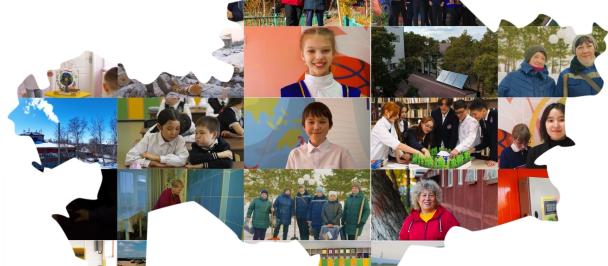Welcoming remarks by Katarzyna Wawiernia, UNDP Resident Representative in Kazakhstan
III ECOJER International Congress "Carbon Neutrality pathways"
June 2, 2023

Qadirli gatysushylar, Khanimdar men myrzalar!
I am honored to be with you here, at the ECOJER International Congress, to unite our efforts in finding carbon neutrality pathways for people and the planet.
As UNDP we appreciate the country's vision and political will for low-carbon development. We see that some important elements for Kazakhstan's sustainable transformation are in place, delineated in the recently adopted Carbon Neutrality Strategy and Eco-Code.
The most recent IRENA research sets out that the benefit value of decarbonizing the global economy by 2050 would be eight times of investment into it. Thus, as governments determine how to invest, they have a choice to make: stimulate fossil fuel industries and get hit by the cost and consequences on people’s wellbeing or invest in an inclusive green economy. Do we think about today or future?
Energy system decarbonization lies at the heart of the green transformation. Kazakhstan possesses abundant renewable energy resources. To unlock this potential and facilitate the transition we need to get the financing right. This requires bringing public and private sectors together.
Public financing plays a critical role in prioritizing sustainable and low-carbon infrastructure by efficiently allocating domestic resources within the national budget. To support Kazakhstan, UNDP actively helps integrate the Sustainable Development Goals into strategic planning and advocates for the alignment of public finances with these goals.
According to experts, most of the investment for the transition will have to come from the private sector. Under the right conditions, we could use blended finance to fill the financing gaps needed for the low-carbon development pathway.
UNDP is proud to have disrupted the green finance market by piloting a range of non-grant instruments that focused on improving the accessibility and affordability of “green” finance for SMEs. Energy efficiency and renewable projects concessional funding, loan guarantee schemes and green bonds allowed to mobilize up to 10US dollars per one dollar of provided support.
“Green” bonds are another debt instrument pioneered by UNDP in Kazakhstan in partnership with «DAMU» Entrepreneurship Development Fund» to leverage private funding on scale. This debut issue helped to establish the sustainable bond market in Kazakhstan. The leverage of funds the UNDP spent to support the first green bonds issuance is remarkable: each dollar of donor funds helped mobilize 175 dollars in following issuances of bonds by ADB, DAMU and others so far, and this is not the end of the story.
We are proud to have trodden the pathway to realizing these benefits on scale. Loan interest and green bonds coupon subsidy instruments have been introduced nationwide in the framework of the State Programme for Promotion of Small and Medium Entrepreneurship "Business Road Map-2025". More than 800mln US dollars of investment in renewable energy projects were leveraged in the last three years through these instruments.
The use of regulatory incentives can also help mobilize green investments. A good example is the introduction of a new type of renewable energy auction in Kazakhstan, supported by UNDP. The auction for solar power features pre-developed project documentation with all detail helping potential investors calculate and cost in all the risks during the bidding process.
The success of this new type of auction allowed the country to receive the lowest price for 1 unit of green energy and secured foreign direct investments worth $40-50 million for a 50 MW solar power plant in Turkestan. I am glad that this pilot has been followed by several similar auctions and that the European Bank for Reconstruction and Development is expanding it now to wind energy auctions.
By bringing together different actors, UNDP stand ready to continue fostering dialogue, knowledge exchange, and partnerships that promote green agenda and address common challenges for the sustainable development for all.
Thank you! Kop rakhmet!
Energy system decarbonization lies at the heart of the green transformation. To unlock this potential and facilitate the green and just transition we need to get the financing right. This requires bringing public and private sectors together.
As UNDP, we are proud to have disrupted the green finance market by piloting a range of non-grant instruments that focused on improving the accessibility and affordability of “green” finance for SMEs and realizing these benefits on scale. For example, loan interest and green bonds coupon subsidy instruments have been introduced nationwide in the framework of the State Programme for Promotion of Small and Medium Entrepreneurship "Business Road Map-2025". More than 800mln US dollars of investment in renewable energy projects were leveraged in the last three years through the instruments, piloted with UNDP’s support.
The use of regulatory incentives can also help mobilize green investments. A good example is the introduction of a new type of renewable energy auction in Kazakhstan, supported by UNDP. The auction for solar power features pre-developed project documentation with all detail helping potential investors calculate and cost in all the risks during the bidding process.
The success of this new type of auction allowed the country to receive the lowest price for 1 unit of green energy and secured foreign direct investments worth $40-50 million for a 50 MW solar power plant in Turkestan. I am glad that this pilot has been followed by several similar auctions and that the European Bank for Reconstruction and Development is expanding it now to wind energy auctions.

 Locations
Locations



